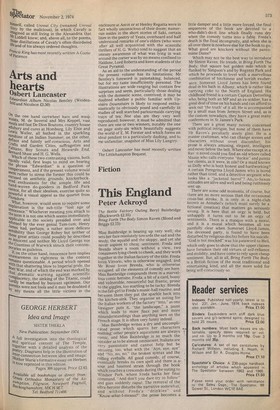Arts and hearts
Osbert Lancaster
Ward ion Album Nicolas Bentley (Weidenfeld and Nicolson £3.50)
CM the one hand cartwheel hats and wasiD waists, M. de Soveral and Mrs Keppel, vast meals and fast De Dion Boutons, country house adultery and cures at Homburg, Lily Elsie and Lewis Waller, all bathed in the sparkling sYnshine of an Indian Summer; on the other, "efiant and faintly self-conscious, Arts and 'grafts and Garden Cities, suffragettes and abians, Boy Scouts and Howards End, 15ernard Shaw and H. G. Wells. Which of these two contrasting visions, both equally valid, first leaps to mind on hearing 4the phrase "Edwardian" is a question of `emnerament, and if the present volume would seen) rather to stress the former this could be excused on aesthetic grounds; knickerbock,ered enthusiasts for the simple life and nand-woven do-gooders in Bedford Park cannot, for all their idealism, exercise quite so werful a visual appeal as the quartet from Ioradora. What, however, would seem to require some Fxpianation is the sub-title "lost age of 1,11,nocence." Whichever meaning you attach to 'le term it is not one which seems immediately !1:213licable to the society presided over and 7nnimed by the ever genial Turn-turn; Henry 'arnes had, perhaps, a rather more delicate ts!nsibility than George Robey but neither of fle,e great artists could possibly be described t",,s Innocent and neither. Mr Lloyd George nor ne Countess of Warwick struck their contemPoraries as guileless. , If, on the other hand, innocence here implies „"naWareness its rightness in the context _`e•Mains questionable. A period which opened bwItil that shattering blow to Imperial pride, the .t7er War, and of which the end was marked by c at dramatic warning against scientific hrnrd°aPlacency, the sinking of the Titanic, could
ly be marked by buoyant optimism. Our
Parents were not fools and it may be doubted if I/ any means all the little victims in the enclosure at Ascot or at Henley Regatta were in fact wholly unconscious of their doom; numerous asides in the short stories of Saki, certain lines in the poetry of Yeats, overheard and half understood remarks of one's elders (who were after all well acquainted with the scientific thrillers of H. G. Wells) tend to suggest that an uneasy awareness of what was lying in wait around the corner was by no means confined to Haldane, Lord Roberts and keen students of the Great Pyramid. As an aid to the understanding of the period the present volume has its limitations; Mr Bentley's foreword is painstaking, balanced, but for my taste insufficiently personal. The illustrations are wide ranging but contain few surprises and seem, particularly those dealing with the domestic scene, contrived; it may be doubted whether a public familiar with Upstairs Downstairs is likely to respond enthusiastically to obviously posed and carefully lit studies of well starched parlourmaids carrying trays of tea. Nor alas are they very well reproduced; however, it must be admitted that there are one or two winners, notably the one on page sixty-six which beautifully suggests the world of E. M. Forster and which forms an ideal pendant to a particularly dashing, and to me unfamiliar, snapshot of Miss Lily Langtry.
Osbert Lancaster has most recently written The Littlehampton Bequest.


































 Previous page
Previous page